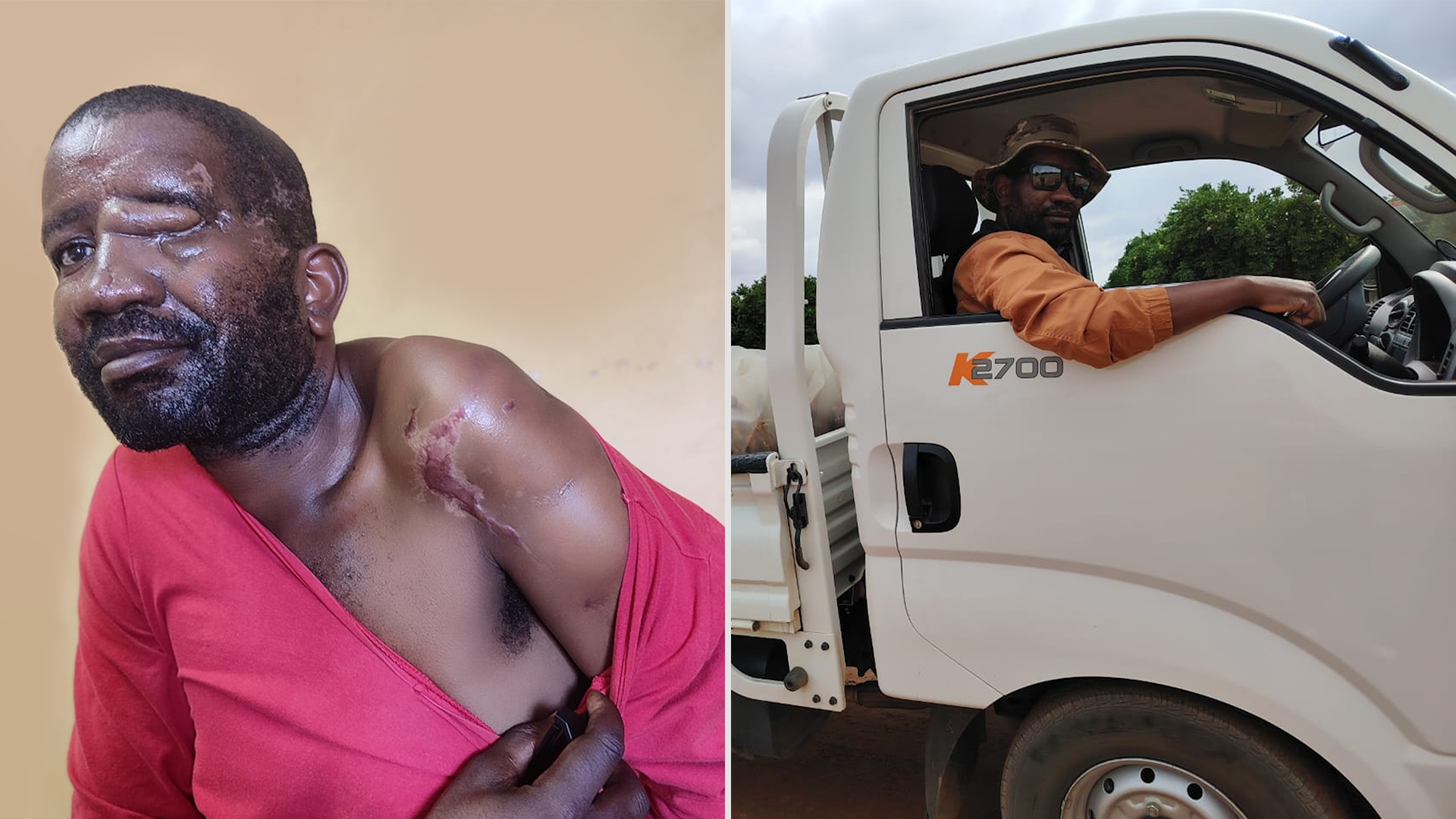Surviving the night of the hyena
Frans Ndlovu shows the scars he was left with from the hyena attack, thanking the multidisciplinary team of doctors and nurses at Netcare Pholoso Hospital who worked day and night to save his life. Mr Ndlovu has returned to work and is able to drive again with a special dispensation.
Trauma system in action after wildlife attack
An unsuspecting Frans Ndlovu was lying on the cool floor with his door open to catch the evening breeze after a 40°C day spent guarding the wildlife against poachers on a Musina game farm during a heatwave in November.
“It was very, very scary, but I am alive,” Mr Ndlovu, a father of two, says of the night he narrowly survived an encounter in the dark with a brazen hyena.
“I was sleeping soundly, and it was a huge shock being attacked in the dark. The animal had my head in its jaws; it was so powerful, and I could feel its teeth in my eye as it dragged me from my room.”
Remarkably, through the pain and shock of the experience, Mr Ndlovu managed to catch hold of a nearby pole as he was being dragged towards the bushes, and he held on with all his strength while screaming for help.
“The people staying in the neighbouring rooms came out to help me, and they fought the hyena off.”
According to Mr Ndlovu’s employer, Izak Nel, the animal reportedly would not let go until one of the men broke a chair over it, and even then, it did not retreat. Bleeding profusely from his head and shoulder, Mr Ndlovu was rushed to a local hospital, where doctors initially stabilised him before he was transferred by helicopter to the emergency department at Netcare Pholoso Hospital in Polokwane.
Dr Vusi Khosa, who has worked in emergency medicine since 2013, says time was critical for Mr Ndlovu’s massive injuries. “It was a life-threatening situation, and the treatment required was complex. On his face, part of the facial muscles were torn away, and the bone was splintered from the crushing fracture due to the force of the hyena’s bite,” says Dr Khosa.
The spotted hyena has one of the strongest bites of all carnivorous mammals, measuring approximately 1 100-pound force per square inch (that is, 77.3kg per square centimetre), according to BBC Science Focus.
“A CT scan revealed the full extent of his injuries, and it was fortunate that the doctors who initially treated him in Musina recognised the need for multidisciplinary expertise and referred Mr Ndlovu to the level II trauma centre here at Netcare Pholoso Hospital.”
Trauma Society of South Africa (TSSA) accreditation of the facility certifies that it has the necessary medical expertise and systems aligned with international best practice in trauma medicine to provide 24-hour emergency care, even in potentially life-threatening and complex cases such as Mr Ndlovu’s.
Shortly before 6am on 26 November 2023, Mr Ndlovu arrived at the hospital via medical helicopter transfer and the trauma team was activated
“In line with established trauma protocols, emergency surgery addressed the most time-critical aspects and the wounds were cleaned and flushed, and we started antibiotics because animal bites can go septic easily and progress to septic shock, which can be fatal,” Dr Khosa says.
That evening just before 7pm, maxillofacial surgeon Dr James Masipa, ophthalmologist Dr Isaac Lesenya and plastic and reconstructive surgeon Dr Puritan Madzhia then began the painstaking task of reconstructing the left side of Mr Ndlovu’s face in a lengthy nine-hour emergency procedure that was completed shortly before dawn at 03:45am the following day.
The team had to remove the last residue from the splintering, crushing force of the hyena’s bite in preparation for Dr Masipa to reconstruct the areas of the eye socket and complex facial structure.
“Time was not on our side, and without a moment to spare for preparation, we had to move in with precision to assist Mr Ndlovu,” Dr Masipa says.
“After the traumatic injury he had sustained, Mr Ndlovu needed quite extensive facial reconstruction, including a forehead flap to rebuild his upper and lower eyelid, although later the damage to his eye, unfortunately, proved too extensive for it to be saved,” Dr Madzhia says.
“As with any bite, animal or human, the bacteria from the mouth causes a severe risk of infection, and we had to be deeply mindful of this during the surgery – this was a case where antibiotics were crucial for his survival and healing,” she says.
Mr Ndlovu spent 22 days recovering at Netcare Pholoso Hospital. “My employer brought my wife and children to visit me at the hospital, and that helped me to cover more quickly. I knew I had to get well for them,” he says.
"It's incredibly heartening to witness Mr Ndlovu's survival and the remarkable healing he's undergone despite the severity of his injuries,” Dr Khosa emphasises. "To witness a father restored to his children is profoundly rewarding for us as medical professionals."
Reflecting on his harrowing ordeal, Mr Ndlovu believes he has much to be grateful for: “First of all, I want to thank the hospital and the doctors for taking good care of me, as well as for the people who fought off the hyena to save me. I’m thankful to my employer and manager for taking action fast, or I wouldn’t be alive today, and to my wife and family for supporting me through this.
“This experience has not changed my belief that wildlife should be protected. These animals are part of nature and provide the livelihood to support my children,” concludes a thankful Mr Ndlovu.













